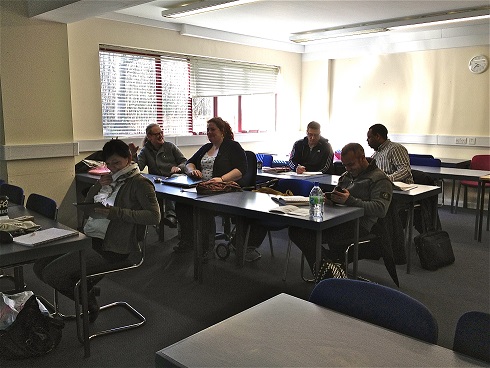Former New Scotland Yard Detective, Geoff Monaghan, recently shared his expertise in drug policy and police policy in a seminar at the University of Kent, England on 4th March 2014.
See Geoff’s PowerPoint presentation here.
Geoff Monaghan, Research Fellow with the Semeion Research Center for the Science of Communication, Rome, Italy (www.semeion.it) and IPAG member ran a one-day seminar on aspects of drug policy and policing policy and practices for drug workers attending the Course on Substance Misuse Management, University of Kent, England (https://www.kent.ac.uk/sspssr/undergraduate/submisman.html). The University of Kent has been at the forefront of education and training for alcohol and drug practitioners since 1982, providing short courses, summer schools, workshops and a wide range of award-bearing programmes.
The Course, convened by Dr Axel Klein, Lecturer in the Anthropology of Conflict, Criminal Justice and Policy, Darwin College, University of Kent (http://www.kent.ac.uk/sspssr/staff/academic/klein.html) provides students with the academic and skills-based knowledge they need to work more confidently and more effectively with alcohol and other drug users.
“It’s been some years since Dr Klein and I have worked together, so I was delighted when he asked me to run this session.” writes Geoff. “The students were enthusiastic, committed and well-informed – testament to the recruitment processes and training programmes in place in the UK.”
“I wanted to use the session to draw attention to some aspects of drug policy and related policing practices which are often overlooked in the literature.” “For example, I cautioned the students about the dangers of slavish adherence to the idea of “evidence-based” drug policy on the basis that this approach could serve to stifle innovative approaches and creative thinking.” “Moreover, as posited by Professors Bennett and Holloway in 2010: ‘There are many factors that influence the generation of policy and it is unrealistic, and perhaps disingenuous, to suggest in relation to drugs policy, that evidence is its primary focus.’ “ (Source: Bennett, T. and Holloway, K. (2010) Is UK drug policy evidence based? (2010) International Journal of Drug Policy, Volume 21, Issue 5, pp. 411-417.)
“In this context, it’s also important to understand that just because the scientific data aren’t available, this doesn’t necessarily mean that a policy decision is flawed – think about the essay A Counterblaste to Tobacco, written in 1604 by King James I of England, in which, amongst other concerns, he highlights the danger to the lungs caused by smoking. No research underpinned his thinking; not a single footnote or reference to be seen! And yet, some 350 years later, with the publication of Doll and Hill’s ground breaking research, which confirmed the causal link between smoking and lung cancer, it turns out the His Majesty was bang on.”
“I also wanted the students to think more critically about some of the simplistic notions bandied about by some drug policy experts and researchers. For example, the idea that ‘zero tolerance’ is always ‘bad’ – sometimes, sometimes not. It depends on how the term is defined and then how the definition is operationalized.” (See Slides 2-5 of Geoff’s presentation here.)
“In addition, when it comes to mulling over drug policies, recommendations for changes in policies and practices and supporting technical papers, I think we all need to be rather more astute.” “For example, cast your eye over the ‘Must’, ‘May’ and ‘Must Not’ matrix included in the 1996 Metropolitan Police Service’s Drugs Strategy and Good Practice and Policy Guidance (see Slides 12 and 13 here).” “On the one hand, police officers are instructed that they ‘must not’ ‘focus on users’ – sounds very ‘harm reductionist’ doesn’t it? Very laudable.” “On the other the other hand, officers are instructed that they ‘must not’ ‘forget users are criminals’.” “Good advice, given what we know about acquisitive crime rates committed by heroin, cocaine and methamphetamine users – they are indeed responsible for huge numbers of thefts, burglaries and frauds – and we want our police officers to focus on these crimes.” “And, let’s not forget that the majority of users are routinely involved in trafficking drugs e.g. supplying, being concerned in the supply, offering to supply.” “But wait, didn’t we just tell them NOT to focus on users?”
“To further underscore this point, take a long, hard look at price and purity data published by UNODC in Word Drug Reports – given that I’ve never seen the information critiqued, I can only surmise that (a) readers don’t bother to look at the data (which is worrying) or (b) having looked at the data, readers accept it as objective and reliable (which is even more worrying).” (See Slide 16 of Geoff’s presentation here.)
“Increasingly, when I’m poring over policy papers, action plans and national strategies I call to mind the short story by Wilkie Collins, The Biter Bit and the exquisite putdown by his character Chief Inspector Theakstone to his arrogant and blundering subordinate: ‘Sir, you have begun by wasting time, ink and paper.’”
“As I said, we all need to be more astute.”



